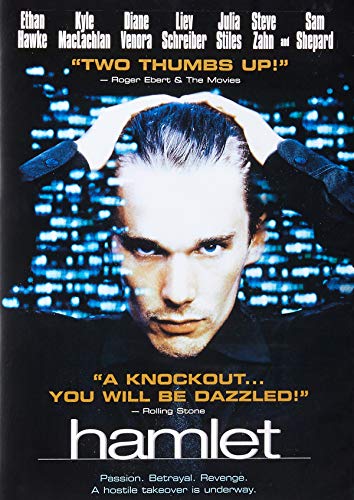***½/**** Image B+ Sound B+
starring Ethan Hawke, Kyle MacLachlan, Diane Venora, Liev Schrieber
screenplay by Michael Almereyda, based on the play by William Shakespeare
directed by Michael Almereyda
by Bill Chambers This review of Michael Almereyda’s Hamlet has long gestated, and the good thing is, the film does not suffer the ravages of memory. My expectations for this modern-dress Shakespeare adaptation were low enough that I presumed its impact would be short-term at best (the play will always transcend approach and performance to a certain degree), having been effectively show-stopped by Kenneth Branagh’s definitively faithful take of 1996. Prior to spinning the DVD, I also internally debated Almereyda’s talked-about corporate setting, a milieu that would seem a better fit for the political backstabbing of “Macbeth” or “Julius Caesar”.
But the current real-life atmosphere of Depression in business acts as a canny, if unspoken, mirror for Hamlet’s mental state. In a way Almereyda’s film, shot prior to most of the tech stocks going belly-up, anticipates the downswing: Its Wall Street is ghostly and devastated, full of glass tombs that scrape a dismal sky and inhabited by, among other Gloomy Guses, a Hamlet (Ethan Hawke) who’s hollowed-out like so many victims of modern materialism and parental loss. (Sam Shepard, who’s always seemed like a dustbowl ghost, plays Hamlet’s dead father.) Having been born into some kind of media wealth–the kingdom of Denmark is now an office tower that’s equipped with screening-room facilities far too elaborate to have been installed out of obligation–Hawke’s Hamlet is also the prototypical pop-culture sponge-slacker (he asks, “To be, or not to be?” in a Blockbuster Video store) who poses his emotions. He’s a walking billboard for Gap-age sullenness.
In conceptual accordance, instead of staging a play, Hamlet now makes an experimental video to incriminate his stepfather. Similar in tone to the brilliant brainwash montage at the centre of Alan J. Pakula’s The Parallax View, this short film starts out by showing a most wondrous patriarchal Christmas morning but soon depicts murder and mayhem within a monarchy–a number of these images rendered all the more tongue-in-cheek by the fact that they’re excerpted from cinematic Shakespeare adaptations of yesteryear. This is a perfect example of how a director with real vision can liberate the Bard for the times; the film-within-a-film also sets up one of the more conspicuous collisions between modernism and the Shakespeare text, as when Hamlet’s caught conspirator, Claudius (Kyle MacLachlan), flees the theatre “frightened with false fire.” Today, a Claudius would remain poker-faced at Hamlet’s presentation, and/or maybe crack wise about it. Hysteria is not the burden of twenty-first century giants.
Yet Almereyda is such an arcane artist to begin with that the sixteenth century contrivances he’s preserved don’t invite very many backward glances; in fact, they feel as much vintage Almereyda as they do vintage Elizabetha. Remember how Baz Luhrmann wallowed in the now-camp machinations of “Romeo and Juliet” for his screaming Hollywood abridgement? Likewise, Almereyda is not out to sophisticate “Hamlet”–like Luhrmann, he retains Shakespeare’s dialogue (although the all-American cast, including a superb Bill Murray as the generally clueless Polonius, is not entirely faithful to the iambic pentameter) and filters it through his own existential obsessions. (Incidentally, Almereyda borrows Luhrmann’s conceit of the narrator as news anchor, and it functions even more organically here.)
When you get right down to it, “Hamlet”‘s been done to death (once Keanu Reeves played the character, there was nothing sacrosanct left), yet the picture will probably seem more familiar to Almereyda followers than to Shakespeare buffs, another recitation of his fixation with death, its spirits, and paternity (he made the pseudo-haunted house movies The Eternal and Nadja, the latter about Dracula’s daughter and her whole messy lineage), plus a chance to mix media the way he did in Nadja. That film identified ‘vampire P.O.V.’ using Fisher Price Pixelvision; here Hamlet keeps a digital video diary, to which we are privy. No wonder both David Lynch and Steven Soderbergh, neither of whom has made anything quite this sexily aloof, have embraced Almereyda’s work in print.
THE DVD
Buena Vista’s DVD release of Hamlet kicks off with trailers for committed and Shakespeare in Love, and though the disc is elsewhere supplemented by previews of Reindeer Games, East is East, Stiff Upper Lips, and Holy Smoke!, it is otherwise featureless. (Oddly, Almereyda’s own film is not trailered.) Hamlet‘s 1.85:1, 16×9-enhanced transfer is filmlike and uncompressed-looking; the icy, murky quality of Brit John De Borman’s cinematography has been preserved and may warrant undeserved complaints to the studio. The Dolby Digital 5.1 track is pregnant during chapter 12’s club sequence, but dialogue demands boosts in volume throughout and split-surround activity is difficult to distinguish. Don’t let me dissuade a rental at the very least of this overlooked original.
113 minutes; R; 1.85:1 (16×9-enhanced); English DD 5.1; CC; DVD-9; Region One; Miramax





